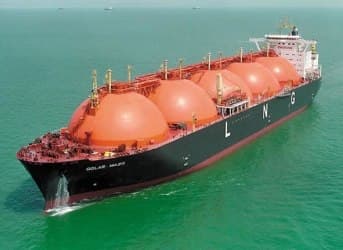This week has drawn the lines in the sand between major industry players—like Dow Chemical and Exxon Mobil—as a decision on US natural gas exports looms (ambiguously).
In this case, the front line is the bottom line. On an industry level, the front line is delineated by those who stand to profit more from increased domestic projects using natural gas (like Dow Chemical Co.), and those who stand to profit more by exporting liquid natural gas (LNG) overseas (like Exxon Mobil).
Dow is worried that if the federal government ends up allowing large volumes of LNG exports, natural gas prices in the US will rise and make the building of new chemical plants and factories unattractive, which in turn would hurt the economy.
Exxon is confident that even with unlimited LNG exports, the revenues generated would far outweigh the concomitant rise in natural gas prices at home.
Dow got rather vocal on the issue this week by publicly disowning a company that it partly owns—Texas-based Freeport LNG, which won’t be getting any of the $6.5 billion it needs for its LNG export terminal plans from Dow.
Dow, of course, is not alone. Neither is Exxon Mobil. They are just two big players in two very large camps, so it will all come down to lobbying prowess in the end.
Royal Dutch Shell Plc has chimed in, warning Washington that the US stands no chance of rivaling Qatar and Australia in terms of LNG exports if it fails to adjust its export rules. However, Shell toned this down a bit (but that’s only because it is already the world’s largest supplier of LNG): “Exports will happen. But I hope that the U.S. will actually keep most of the gas back because it will help them to industrialize parts of the U.S. more,” Shell CEO Peter Voser told Bloomberg.
For now, suppliers cannot ship LNG (without special permission and a lot of red tape) to any customers not covered by US free trade agreements—including Japan, which is really hoping for unlimited US LNG exports.
Upgrade to our premium service and find out what top intelligence company Jellyfish Operations is predicting will happen in the Middle East and North Africa: Start a 30 day No Risk Free Trial.
Dow and other chemical companies have been given a boost in terms of lobbying with the creation of a new lobby group, America’s Energy Advantage (AEA), which is stepping up the pressure for caps on LNG exports. At the same time, Dow’s lobbying efforts also were hit when the National Association of Manufacturers (NAM) suddenly came in support of unlimited gas exports.
On 15 January, NAM published a statement in its blog suggesting that it “supports open and expanded trade and opposes efforts to limit manufacturers’ ability to expand exports overseas.”
The debate has intensified significantly this week, and the coming weeks will give us a better idea of how lobbying efforts are panning out for the ultimate outcome.
In the meantime, here are some other issues that are (or should be) getting significant play on the industry radar:
• The Algerian hostage crisis is over, but it’s really only just begun. Western energy interests will now face risks elsewhere in the Sahel, and not nearly enough attention is being paid to geopolitics. (Check out our premium newsletter this week for expert analysis of the situation)
• The United Kingdom may quit the European Union if a referendum after new elections goes through and the public decides it’s better to go it alone. This will be the death knell for the EU. For energy development, though, once the dust settles on this possible scenario, things could get less complicated in terms of the regulatory environment (our Premium Newsletter will address this issue in the coming weeks)
• Uranium prices seem to be at a critical juncture; Post-Fukushima disaster fears that nuclear power was in its death throes failed to correctly assess the situation—as illustrated by the hundreds of new nuclear projects in the works … the next few years could see not only a comeback for nuclear, but a stronger sector than ever
That’s it for this weeks news in today’s special report we again dip into our Premium Service and take a look at the Executive Report which explains why the energy industry is not safe in North Africa.
To find out more information on our premium service please click here: https://oilprice.com/premium

















